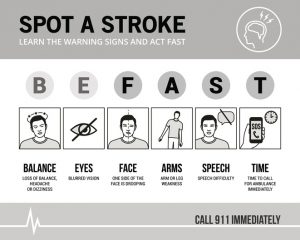
Risk factors that increase a person’s odds of experiencing a brain attack include older age, gender, race, family history of stroke, and a personal history of stroke. Lifestyle habits, too, play a large role in stroke. That is why it is important to live a healthy lifestyle as much as possible to reduce your risk of a brain attack.
If stroke is not treated immediately, the patient runs the risk of death, as time passes and the brain is not receiving oxygen. Other complications of stroke that are lifelong include paralysis or loss of certain muscle movements, difficulty talking or swallowing, memory loss or thinking difficulties, emotional problems and depression, pain, and changes in behavior and self-care ability.
Below you will find a list of prevention tips to help reduce your risk of stroke and the associated complication.
Also Read : Ischemic vs Hemorrhagic Stroke: Causes, Symptoms, Treatment, and Prognosis
Natural remedies and prevention tips for stroke
Stop smoking
When it comes to stroke prevention, quitting smoking and avoiding second-hand smoke should be your top priority. This is so important because smoking doubles your risk for having a stroke and substantially increases your risk for fatal heart problems such as coronary heart disease. The good news is, it’s never too late to quit. According to The National Stroke Association, a person’s stroke risk is greatly reduced no matter how old they are when they decide to quit smoking.
Reduce alcohol consumption
Although there is some evidence that moderate alcohol consumption can lower heart disease and stroke risk, any potential benefits are negated when you drink too much. Males should not drink more than three alcoholic beverages per day and females should drink no more than two. Any more than that and you increase your heart attack and stroke risk.
Reduce stress
Stress can increase blood pressure and cholesterol levels – both of which increase the risk of stroke. Even more problematic is the fact that stress can make you more prone to developing atherosclerosis (a condition characterized by narrowing of the arteries), and approximately 80 percent of all strokes are caused by atherosclerosis. Some good ways to reduce stress include sharing your feelings, being more assertive, learning to say no, taking time to laugh, giving yourself some alone time every day, treating yourself to vacations, keeping a journal, taking a bath, meditating, exercising, and doing something that makes you laugh.
Be more physically active
Exercise is an essential part of the stroke prevention recipe because it helps lower high blood pressure and cholesterol levels, prevent diabetes, and reduce stress – all of which are risk factors for heart attack and stroke. Perhaps even more important is the fact that exercise helps you to obtain and/or maintain a healthy body weight, which vastly reduces your stroke risk.
Avoid junk food
Consuming a healthy diet is arguably the most important thing you can do when it comes to stroke prevention. A healthy diet reduces the same heart attack and stroke risk factors as exercising, but its effects are even more profound. To reduce your stroke risk, start by eliminating or vastly reducing your intake of refined and packaged foods, and base you diet on whole, unprocessed foods instead.
Foods and beverages to consume in your stroke prevention diet include black or green tea and fruits and vegetables like pomegranates, which are high in antioxidants.
Manage other conditions
If you have high blood pressure, diabetes, cholesterol, or other conditions, these can all contribute to a higher stroke risk. It is highly important that you manage any other coexisting conditions in order to further reduce your risk of stroke. The good news is, many of these conditions share similar lifestyle factors pertaining to overall healthy living. Exercising, eating well, not smoking, and reducing stress can all work to control other health conditions along with reducing your risk of stroke.
Diet Tips to Prevent Stroke
Because lifestyle factors play such a large role in stroke risk it’s important to adhere to a healthy lifestyle. One area of a healthy lifestyle is diet and knowing the right foods to eat can help you prevent stroke.
It is clearly observed that in countries where dietary habits are on the unhealthier side tend to have higher incidences of stroke. Among countries with high intakes of whole grains, vegetables, and fruits incidences of stroke are far less.
A great diet to adhere to if you want to prevent stroke is the Mediterranean diet. This diet is continuously hailed as ideal for optimal brain and heart health. This is because there is a large focus on lean proteins, legumes, whole grains, low sugar, and plenty of fruits and vegetables. The Mediterranean diet also integrates olive oil which is well known to be a heart-healthy oil.
Even if you have already experienced a stroke it’s still important that you change your eating habits to reduce your risk of an additional one from occurring along with promoting healing in the body. It is still a good idea to stick with the Mediterranean for this.
Here are some other diet tips to follow when preventing stroke through diet:
- Eat a wide variety of foods
- Eat a rainbow of foods
- Choose five or more cups of fruits and vegetables each day
- Read food labels for ingredients for cholesterol, saturated fat, trans fat, sodium, dietary fiber, calories, and total fat
- Limit your intake of saturated fat, trans fat, and cholesterol
- Reduce sodium in your diet
- Maintain an achieve a healthy weight
- Reduce your intake of added sugar
- Get adequate amounts of potassium
By incorporating these healthy eating tips into your life you can have greater success in reducing your risk of stroke and improving your overall health.
Also read:
- Heart attack symptoms in women: Risk Factors when at 40, 50, 60
- 10 foods to help prevent clogged arteries naturally
- Yoga for heart health: Yoga poses to reduce the risk of heart disease